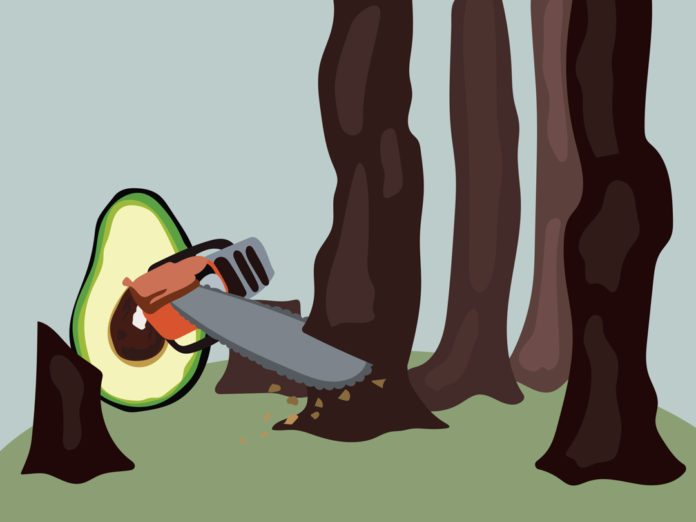I grew up hating avocados. I thought that they were mushy, strangely slimy, and tasted like dirt. I distinctly remember picking them out of salads, sandwiches, and sushi rolls — I truly despised them. But now, either by the influence of avocado toast trends or just the maturing of my tastebuds, I love them. Does this make me basic? Probably. Deal with it.
There is no denying that this decade has seen an uprising trend in avocado consumption. Not only have we seen the popularity of this fruit surface on social media, but more recipes are highlighting avocados in items such as smoothies, sauces, and baking. The stats don’t lie. The number of Google searches for “avocado toast” in the past decade has continued to rise annually, with some sources predicting that the industry will grow economically by another 5.14 per cent by 2025 in Canada alone.
A couple of years ago, I watched an episode of Netflix’s Rotten entitled “The Avocado War,” and I quickly learned that my favourite toast topper was contributing to some major cultural, political, and environmental issues.
Mexico, specifically Michoacán, the state known for having the most ideal avocado growing climate year-round, exports 90 per cent of its crops to Canada and the U.S. Locals are known to refer to the industry as “green gold,” as the exportation of the crop is a major money maker for the country.
The state, however, is also heavily influenced by drug cartels, and as such, the cartels are closely tied to the avocado industry. As avocados are one of the country’s leading agricultural exports, the cartels are apparently expanding their economic control to include the legal exportation of goods and not just illegal drugs. It sounds confusing, but basically, the cartels are broadening their scope of business, with the goal being to gain control over this sector of the economy. One source states, “By taking over lands used to produce avocados, [drug cartels] become ‘informal owners’ of the fields and profit from sales.”
Besides this sector slowly losing control to organized crime, the downside of this invasion is also, of course, that it makes the industry incredibly dangerous. Known for being violent, threatening, and ruthless, the takeover of farms has caused an influx of wars, civilian deaths, and international threats. The term “Cartel Tax” is now a common term in the industry, as those who do not abide by their rules and refuse to pay additional taxes on cartel-run farms are reportedly tortured and killed. Yes, this is all because of avocados. It is that influential of an industry.
While I think that these cultural and economic issues are where the bulk of the concerns lie within the industry, we should not ignore the environmental impacts as well. Up to 40 per cent of pine trees are cleared each year by farmers in order to make room for more avocado crops. Although this is illegal, and many of these larger species of trees are sources of cover crops and their canopies prevent droughts, the high price tag that the industry brings persuades more farmers each year to switch occupations and accommodate more land for farming.
Therefore, besides the frustration we may feel about the high price tag of avocados we see at our local grocery store, the industry stems from a background of some major political and cultural issues. Like many of the topics this column has discussed, it is ultimately up to the big-wigs in charge to make decisions on how to get this industry back on track. Tackling organized crime is undeniably dangerous and incredibly difficult to navigate; however, with the rising trend of avocado consumption in North America, it can also be argued that consumers play a role in increasing the value of these farms. The avocado industry is gaining momentum due to the demands from Canadian and U.S. citizens and in return, this ramps up the economic value of these Mexican farms. Personally, although my love affair with avocados is strong, I certainly do not buy as many as I once did. To me, the cultural impacts that the fruit represents are too significant for me to support.
Sydney is a BA English major, creative writing student, who has been a content contributor for The Cascade and is now the Opinion editor. In 7th grade, she won $100 in a writing contest but hasn’t made an earning from writing since. In the meantime, she is hoping that her half-written novels will write themselves, be published, and help pay the bills.


